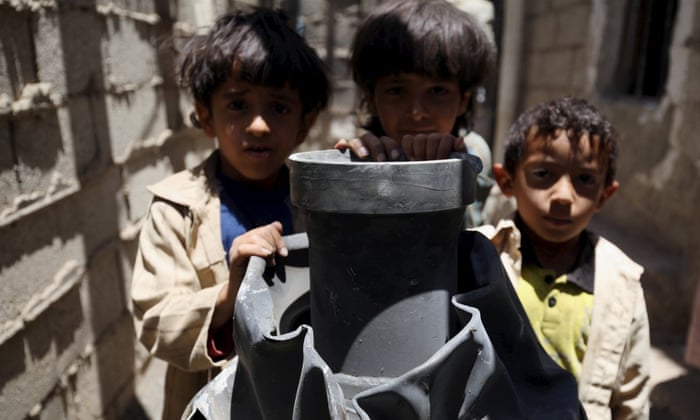UN children’s agency warns of civil war’s devastating toll after 550 civilians die – 115 of them children – in major escalation of violence over past month
Date: Fri, 24 Apr 2015 22:38:41 +0200
Child casualties highlight brutal cost of Yemen conflict as civilian deaths mount
More than 550 civilians, including at least 115 children, have been killed in the street fighting and air strikes that have claimed more than 1,000 lives in Yemen since 26 March, according to the UN.
The UN children’s agency, Unicef, said at least 64 children had been killed by air strikes, 26 by unexploded ordnance and mines, 19 by gunshots, three by shelling and three by “unverified causes related to the conflict”. The violence has maimed a further 172 children, and injured a total of 1,185 civilians.
“There are hundreds of thousands of children in Yemen who continue to live in the most dangerous circumstances, many waking up scared in the middle of the night to the sounds of bombing and gunfire,” said Julien Harneis, Unicef representative to Yemen.
“The number of child casualties shows clearly how devastating this conflict continues to be for the country’s children. Without a speedy end to the violence, children will be unable to lead normal lives.”
In a statement released on Friday, the UN high commissioner for human rights (OHCHR) said that while the fighting between Houthi rebels and other armed groups had often been indiscriminate, Saudi-led coalition air strikes against Houthi rebels were still killing dozens of civilians despite the official end of the bombing campaign.
OHCHR said air strikes on military and civilian positions in Sana’a, Ibb, Hajjah, and Taiz, which occurred on 22 April – a day after Saudi Arabia said it was halting the strikes – killed 58 civilians, including seven children.
Forty civilians were killed and 70 wounded that morning after warplanes twice hit a bridge in Ibb governorate. Civilians rushing to help the injured were reportedly hit by a second wave of strikes.
A day earlier, said OHCHR, at least 20 civilians were killed and 120 injured in an air strike on a building in the Faj Attan area of Sana’a City. The raid also damaged a number of UN offices in the Yemeni capital, including those of OHCHR.
Last Sunday, Oxfam claimed an airstrike had hit one of its warehouses in northern Yemen, describing the incident as “an absolute outrage”. Another NGO, International Medical Corps, said a coalition airstrike on Monday injured six staff members working in their office in Sana’a and damaged humanitarian supply warehouses containing medical and other relief supplies.
Saudi Arabia and its allies launched the air war at the end of March in an attempt to restore the authority of President Abd-Rabbu Mansour Hadi, who was forced to flee abroad last month as Iranian-backed Houthi fighters swept across the country.
Fighting between Houthis and local armed groups in Yemen’s southern governorates claimed at least 14 civilian lives on 21 April, with the same number injured. OHCHR said it had also received separate reports of snipers killing a child in the southern city of Dhale and four civilians emerging from a mosque in the port city of Aden.
The agency said weeks of bombings and street battles have also left hospitals damaged and without water, morgues inundated with bodies, and ambulances unable to reach casualties because of a lack of fuel. The UN estimates at least 64 public buildings have been partially or completely destroyed as a result of the conflict.
“We urge all sides to the conflict to ensure that international human rights law and international humanitarian law are respected, and to ensure that all measures are taken to ensure civilians are protected,” said a spokesman. “All sides must ensure that the humanitarian aid – which is desperately needed – can reach the people of Yemen.”
Mohamed Elmontassir Hussein, the International Rescue Committee’s country director for Yemen, said the humanitarian situation was becoming catastrophic.
“Hospitals are not working properly because there is no water and no electricity and not enough medical supplies,” he said. “The bombing is continuing and the fighting on the streets is still ongoing and there is no differentiation between civilians and armed people on the streets.”
Hussein said proper humanitarian access had to be provided as soon as possible and called for a complete end to the air strikes.
“We are not reaching everyone,” he said. “It’s insecure and although our national staff on the ground are trying their best to support hospitals, it’s time-consuming to arrange, as is delivering drugs to some of the hospitals. The airport has to reopen and there has to be some kind of return to regular life.”
Cédric Schweizer, the head of the International Committee of the Red Cross (ICRC) Yemen delegation, echoed Hussein’s calls.
“There are three priorities,” he said. “First, medical aid and other assistance must be allowed in. Second, people must be able to leave their homes to have access to shops and basic services (such as they are). Third, the ICRC and other humanitarian organisations must be allowed to carry out their work.”
On Friday, the UN’s World Food Programme (WFP) warned that 12 million people in the country did not know where their next meal was coming from – a 13% rise since the conflict escalated at the end of last month.
The agency said it was trying to deliver food to more than 100,000 people sheltered around Aden.
“But we are struggling to reach people because of deteriorating security,” a WFP statement said, adding that dire fuel shortages were also hampering the response.
The food agency said it hoped to provide emergency food aid to 2.5 million people from May to July.
